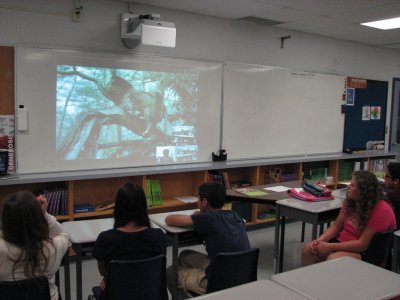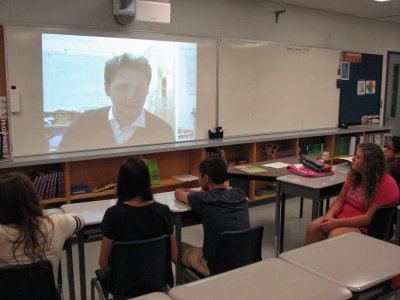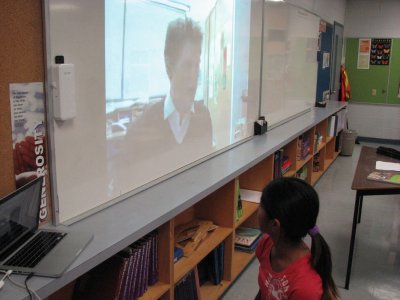News
Latest Lion Aid News
The Importance of Innovative Conservation Education
Wednesday 8th October 2014
|
Over a week ago, I had the absolute pleasure of speaking to a wonderful Grade 8 Science Class in Canada via Skype about Canned Hunting and how it is affecting wild lion populations. The class is led by an inspirational teacher called Joe Grabowski, who regularly uses Skype to educate his class about wildlife conservation and he has also written a series of excellent blogs about each of the talks his class has listened to. I strongly recommend you check out his blog here. It is so reassuring to know that there are individuals like Joe out there; teachers who are proactively educating the young people of today about the threats facing endangered species. As one of my heroes, Gareth Patterson, once wrote, “Only when we see ourselves as part of the natural world, will we then see its destruction as self-destruction!” To me, this single quote sums up the importance of conservation education, and never before has conservation education been more prevalent than it is right now!
It is only my opinion, but we need to keep searching for innovative ways of engaging the attention of young people, such as Skype in the Classroom, and trying to inspire them to get more involved in helping to preserve the natural world around them. Gone are days in which we should educate young people through crosswords and word searches! The majority of young people within the educational system are now confidently exploring websites, watching YouTube videos, responding to podcasts and interacting with downloadable apps. This is the reality of education in our ever-changing, modern world and these are the tools which we should be harnessing in order to educate young people about wildlife conservation. Historically it appears that we have relied on Zoos to educate young people about the conservation of wild animals. However, relying on zoos as a form of education is becoming increasingly controversial and in particular, a recently published paper in the academic journal, Conservation Biology, found that, of over 2,800 children surveyed following visits to London Zoo, the majority demonstrated no positive learning outcomes at all. Indeed, many children were deemed to show not just a lack of learning, but a negative learning outcome. You can read more about this paper in an news article put together by the Captive Animals' Protection Society here. Whether or not Zoos provide effective conservation education is beyond the scope of this blog, and an in-depth comparative study between Zoos and other means of education needs to be carried out, but it does raise the important point that we should not be relying solely on these establishments to educate the young people of today about wildlife conservation Like I said in a previous blog, LionAid is proud to be an official partner with Skype! Through this partnership, we are dedicated to educating young people, from all around the world, about the threats facing lions. Skype in the Classroom is an effective and innovative way of getting experts to talk to young people about wildlife conservation. My own personal favourite conservational educational resource is Sharks 4 Kids, a website run by Jillian Morris! Her wonderful site not only provides innovative and engaging resources, but it also allows teachers to arrange for Jillian to give talks on shark conservation, either in person or through Skype. This is all without an animal having to be kept in a cage or aquarium! If you have a child, please encourage their school to organise a Skype talk with Jillian – and with LionAid as well!
Like I said before, conservation education has never been more pertinent than it is right now! The young people of today have a voice, and isn’t it our responsibility to provide them with the means so people can hear it? Through education, we might just be able to provide them with such opportunities, and perhaps inspire one or two future conservationists along the way! I thought it would be nice to end this blog with a few comments which I had received from my recent talk with Joe Grabowski’s Grade 8 class in Canada. You can read a blog about my talk with Joe's class here. As you read the comments, I hope you too will feel the same relief and excitement as I did when I first read them, that the young people of today really do care about the natural world, as long as we give them the opportunity to do so. Emily “Thank you so much for bringing what's happening to lions to our attention! It was very surprising to hear, and I hope one day it will be illegal.” Yzabel “Thank you so much for skyping us! I learned so many new things about lions I’ve never knew before and it's really surprising that people would actually pay that much to shoot a lion and real sad. Hopefully one day this ends and I’ll do my part to help out.” Lucas “Thank you so much for skyping with us Matthew. It was very sad to learn about what a problem is facing lions. I am very glad however, to know that we have people trying to put a stop to it” Daniella “This one was so sad but it was so educational - I loved it.” Source: Jensen, E., 2014, Evaluating Children’s Conservation Biology Learning at the Zoo, Conservation Biology, Vol. 28, No. 4, 1004-1011 Tags: Education, Skype, Lions, Matthew Payne, LionAid, Categories: Traditional Medicine, Trophy Hunting, Education |






